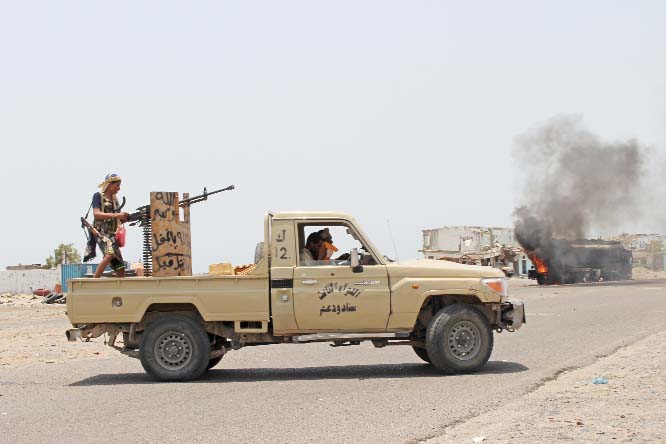
AP, Yemen :
Fighting between their allies in southern Yemen has opened a gaping wound in Saudi Arabia and the United Arab Emirates’ coalition against the country’s rebels. If they can’t fix it, it threatens to tear the country apart into even smaller warring pieces.
Last week saw a stunning escalation in the turmoil in the south, as Emirati warplanes blasted fighters loyal to Yemen’s internationally recognized president, Abed Rabbo Mansour Hadi – the man the coalition is supposed to be trying to restore to power. Dozens were killed, and the UAE rubbed salt in the wound by calling Hadi’s forces “terrorists.”
Hadi’s loyalists call the strike a “turning point” and accuse the UAE of fomenting a coup by its allied militias to topple his government and seek secession in the south.
In August, the militias overran Aden and other southern cities, driving out Hadi’s forces in bloody fighting. When they tried to expand into oil-rich Shabwa province, the Saudis rushed supplies to Hadi’s forces to drive them back.
With U.S. backing, Saudi Arabia and the UAE launched their coalition in 2015 to fight the Iran-backed Shiite rebels, known as Houthis, who had seized the capital, Sanaa, and large parts of the country. The coalition vowed to stop what it considers an Iranian takeover attempt. The ensuing civil war has killed tens of thousands, driven millions from their homes, destroyed the country and thrown much of the population into near starvation.
Yet four years later, the Houthis remain in control of much of the north, the fight against them stalled.
The two Gulf powerhouses have had clashing agendas.
The UAE, which abruptly announced last month that it was pulling most of its forces out of Yemen, wants its local allies to ensure its continued domination over the south, Yemeni officials believe. The UAE also shuns Hadi because of his links to its nemesis, the Muslim Brotherhood.
Saudi Arabia, which backs Hadi, fears expansion of Emirati control and opposes the south’s secession, which would effectively enshrine Houthi rule in the north.
Long contained, those agendas now risk unraveling the anti-Houthi alliance with bloody consequences on the ground.
Fighting between their allies in southern Yemen has opened a gaping wound in Saudi Arabia and the United Arab Emirates’ coalition against the country’s rebels. If they can’t fix it, it threatens to tear the country apart into even smaller warring pieces.
Last week saw a stunning escalation in the turmoil in the south, as Emirati warplanes blasted fighters loyal to Yemen’s internationally recognized president, Abed Rabbo Mansour Hadi – the man the coalition is supposed to be trying to restore to power. Dozens were killed, and the UAE rubbed salt in the wound by calling Hadi’s forces “terrorists.”
Hadi’s loyalists call the strike a “turning point” and accuse the UAE of fomenting a coup by its allied militias to topple his government and seek secession in the south.
In August, the militias overran Aden and other southern cities, driving out Hadi’s forces in bloody fighting. When they tried to expand into oil-rich Shabwa province, the Saudis rushed supplies to Hadi’s forces to drive them back.
With U.S. backing, Saudi Arabia and the UAE launched their coalition in 2015 to fight the Iran-backed Shiite rebels, known as Houthis, who had seized the capital, Sanaa, and large parts of the country. The coalition vowed to stop what it considers an Iranian takeover attempt. The ensuing civil war has killed tens of thousands, driven millions from their homes, destroyed the country and thrown much of the population into near starvation.
Yet four years later, the Houthis remain in control of much of the north, the fight against them stalled.
The two Gulf powerhouses have had clashing agendas.
The UAE, which abruptly announced last month that it was pulling most of its forces out of Yemen, wants its local allies to ensure its continued domination over the south, Yemeni officials believe. The UAE also shuns Hadi because of his links to its nemesis, the Muslim Brotherhood.
Saudi Arabia, which backs Hadi, fears expansion of Emirati control and opposes the south’s secession, which would effectively enshrine Houthi rule in the north.
Long contained, those agendas now risk unraveling the anti-Houthi alliance with bloody consequences on the ground.

